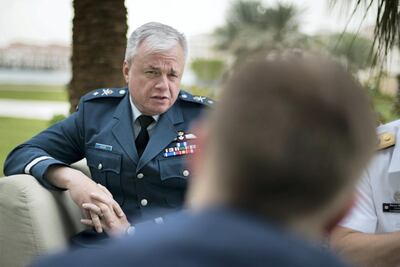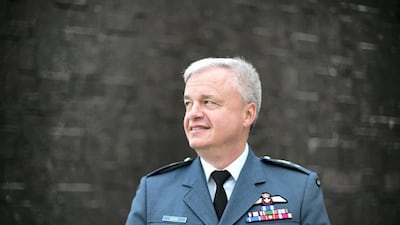ISIS is likely to re-emerge in Iraq unless the grievances that birthed it are resolved by the country's new government, the general in charge of Canada's anti-ISIS operations told The National.
In an exclusive interview on Tuesday General Colin Keiver said the long-term defeat of ISIS hinged on jobs, infrastructure and the provision of basic services such as water and power to Iraq’s war-scarred population.
“The military side can only do so much in Iraq,” he said. “You have got to go after the cause of these grievances, and until you do that this is something that will continue.”
ISIS was born in cities like Fallujah, in Anbar province, where a flagging economy, unemployment and anger made it a fertile environment for radicalisation. By 2014 its so-called caliphate had spread across a patch of Iraq and Syria equivalent to the size of Britain.
Although Iraq declared territorial victory over ISIS in December 2017, the group has gone underground and is looking to reform in Iraq, Syria and Libya.
“I think they know that the dream of the caliphate is dead,” said Mr Keiver. But “they are trying very hard to recreate themselves as an insurgency.”
“The Iraqi people and their government need to come together in peace in the same way as they came together in war in 2014 to defeat ISIS.”
That vision is hampered by stagnation in Iraqi politics. Although Prime Minister Adel Abdel Mahdi finally formed a government last October, four months after nationwide elections, vital cabinet positions, notably defence and the interior, remain unfilled.
“There’s no doubt you need an interior minister. And they must tackle corruption in Iraq,” said Mr Keiver.
A major stumbling block is the tussle for political dominance between Washington and Tehran, both of whom are pushing for an administration open to their interests.
Earlier this month, US President Donald Trump announced American troops would be stationed in Al Asad airbase, north-west of Baghdad, to monitor Iran, prompting accusations that he cared little for Iraqi sovereignty.
But Canada is more pragmatic. “There is a recognition that there is no future for Iraq that does not involve some sort of relationship with Iran,” said Mr Keiver, who expressed hope that “the government in Iraq is able to sort out what that relationship means.”
Another hindrance to crushing the final remnants of ISIS is Mr Trump’s shock December decision to withdraw US troops from Syria, sparking the resignation of Defence Secretary James Mattis and Brett McGurk, US Special Envoy to the coalition.

“It makes it more complicated,” said Mr Keiver, who added that every player in the anti-ISIS coalition is in discussion now “to work out what this means and how we address this issue.”
Still, there is cause for optimism. Mr Keiver described the Iraqi security forces, who Canada is currently training, as “hardened and capable” and praised the country’s recent democratic election.
Last June, Canada announced it would command a Nato training mission in Iraq, to run in parallel to Operation Impact, Ottawa’s contribution to the global coalition against ISIS, which is due to expire in March.
When asked if it would be renewed, Mr Keiver hesitated. “All indications are that it will be extended but that is entirely a government of Canada call,” he said.

